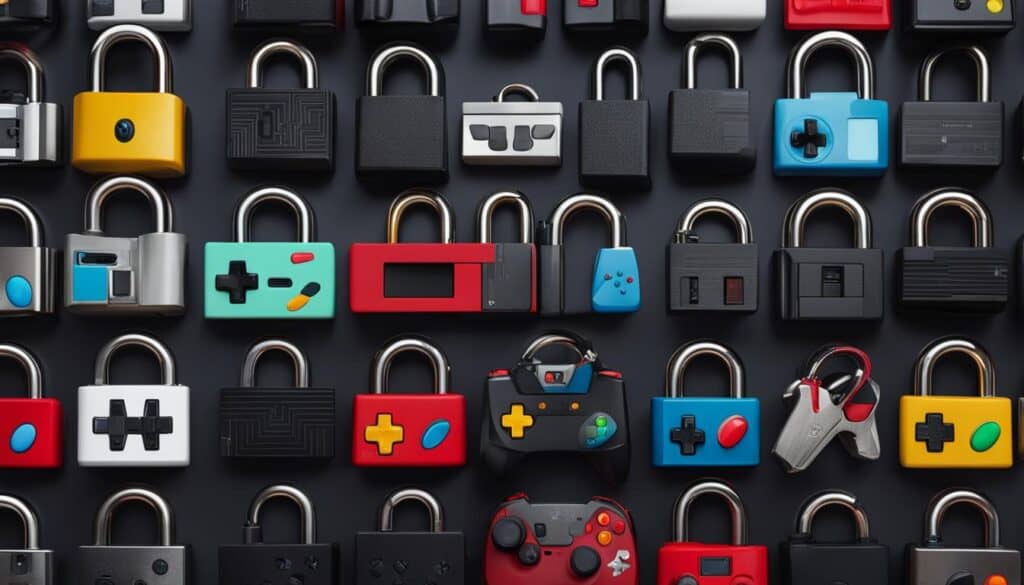Welcome to our guide on gaming cybersecurity! In this article, we will explore the importance of online gaming security and provide essential tips to protect gamers from cyber threats. With the rising popularity of gaming, it’s crucial to prioritize cybersecurity to ensure a safe and enjoyable gaming experience.
Online gaming provides endless entertainment, but it also exposes gamers to potential risks such as hacking, identity theft, and malware attacks. By following these cybersecurity tips, you can safeguard your personal information and protect yourself from the ever-evolving threats in the gaming world.
Key Takeaways:
- Creating strong passwords and using unique ones for each gaming account adds an extra layer of protection.
- Enabling two-factor authentication provides an additional level of security for gaming accounts.
- Regularly updating game and system software ensures that you have the latest security patches installed.
- Being cautious when sharing personal information online and using reputable antivirus software can help prevent phishing and malware attacks.
- Connecting to secure Wi-Fi networks and using secure payment methods for in-game purchases are essential for minimizing cybersecurity risks.
The Importance of Gaming Cybersecurity

With the increasing popularity of online gaming, it’s crucial for gamers to prioritize cybersecurity. Hackers target gamers to steal personal information, such as credit card details and login credentials. Protecting against cyber threats is essential to ensure a safe gaming experience.
Gaming cybersecurity is not just about protecting your personal information; it also helps safeguard your gaming progress, achievements, and in-game purchases. By implementing effective cybersecurity measures, gamers can minimize the risk of falling victim to hacking and other malicious activities.
One of the key aspects of gaming cybersecurity is maintaining strong and unique passwords for gaming accounts. Using easily guessable passwords can make it easier for hackers to gain unauthorized access. Consider using a password manager to securely store your login credentials and generate strong, random passwords for each gaming account.
Protecting Gamers Against Cyber Threats
Aside from strong passwords, enabling two-factor authentication (2FA) provides an additional layer of security. With 2FA, gamers must provide a second form of verification, such as a code sent to their mobile device, in addition to entering their password. This significantly reduces the likelihood of unauthorized access to gaming accounts.
“Prioritizing gaming cybersecurity is not an option but a necessity. The risks associated with online gaming are real, and gamers need to be proactive in protecting themselves.”
Regularly updating game and system software is also essential for gaming cybersecurity. Game developers and console manufacturers frequently release updates that address security vulnerabilities. Keeping both the game and system software up to date ensures that gamers have the latest security patches installed, minimizing the risk of exploitation by hackers.
Gaming cybersecurity goes beyond password protection and software updates. Gamers should also be cautious when sharing personal information online, avoid clicking on suspicious links, use secure Wi-Fi networks, and educate themselves about the latest threats and protective measures. By taking these steps, gamers can enjoy their favorite games with confidence, knowing that they have taken the necessary precautions to protect their digital lives.
Strong Passwords for Gamers

Creating strong passwords is a crucial step in enhancing gaming cybersecurity and protecting gamers from cyber threats. Using easily guessable passwords like “123456” or “password” can make it easier for hackers to gain unauthorized access to gaming accounts. It is recommended to choose a password that is a combination of uppercase and lowercase letters, numbers, and special characters to make it more difficult to crack.
“A strong password is like a fortress that protects your gaming kingdom from cyber villains.”
Consider using a password manager tool that securely stores all your login credentials. This eliminates the need to remember multiple passwords and reduces the risk of using weak or repetitive passwords. Password managers generate complex passwords for you and encrypt them, ensuring that your gaming accounts remain secure.
Quick Tips for Creating Strong Passwords:
- Use a minimum of 12 characters
- Mix uppercase and lowercase letters
- Include numbers and special characters
- Avoid common words or phrases
- Don’t use personal information like birthdays or names
- Use a unique password for each gaming account
By following these tips and implementing strong passwords, gamers can fortify their accounts and protect themselves from cyber threats. Remember, a strong password is the first line of defense against hackers attempting to breach your gaming fortress.
Gaming Cybersecurity: Two-Factor Authentication for Enhanced Account Security

Gaming cybersecurity is a crucial aspect of protecting gamers from cyber threats. As the gaming industry continues to grow, hackers are increasingly targeting gamers to gain unauthorized access to their personal information and gaming accounts. One effective method to enhance account security is by enabling two-factor authentication (2FA).
Two-factor authentication adds an extra layer of protection to gaming accounts by requiring users to provide a second form of verification, such as a unique code sent to their mobile device, in addition to entering their password. This ensures that even if a hacker manages to acquire the password, they would still need the additional verification to gain access.
Enabling 2FA is relatively easy and can be done through the account settings of most gaming platforms. Once enabled, gamers will receive a prompt to enter the verification code every time they log in. This simple step significantly reduces the risk of unauthorized access and protects gamers from potential cyber threats.
Tips for setting up two-factor authentication:
- Choose a reputable and secure 2FA method, such as using an authenticator app or receiving codes via SMS.
- Ensure that the mobile device used for 2FA is password-protected or secured with biometrics.
- Regularly update the 2FA method and review the authorized devices associated with the gaming account.
By implementing two-factor authentication, gamers can enjoy a safer gaming experience and have peace of mind knowing that their accounts are protected from cyber threats.
Gaming Cybersecurity: Keeping Game and System Software Up to Date
Regularly updating game and system software is crucial for gaming cybersecurity. Game developers and console manufacturers often release updates that address security vulnerabilities. Keeping both the game and system software up to date ensures that gamers have the latest security patches installed.
Failure to update game and system software can leave gamers vulnerable to cyber threats. Hackers often exploit weaknesses in outdated software to gain unauthorized access to gaming accounts and steal personal information. By staying updated, gamers can significantly reduce the risk of falling victim to hacking and other malicious activities.
Updating game software is relatively easy and can be done through the gaming platform’s built-in update feature. System software updates, such as those for consoles or PCs, can usually be accessed through the settings menu. Gamers should regularly check for available updates and install them promptly to maintain optimal security.
Why Upgrading Game and System Software is Essential:
- Security patches: Updates often include security patches that address known vulnerabilities in the software. These patches protect against potential cyber threats.
- Improved protection: Game and system software updates can include new security features that enhance protection against hackers and other malicious activities.
- Bug fixes: Updates often fix bugs and glitches that can be exploited by hackers. By resolving these issues, gamers can reduce the risk of unauthorized access to their accounts.
- Access to new features: In addition to security benefits, updates may introduce new features and gameplay improvements, enhancing the overall gaming experience.
By making regular updates a priority, gamers can create a more secure gaming environment and enjoy their favorite games without the worry of cyber threats.
Gaming Cybersecurity: Safeguarding Personal Information

When it comes to gaming cybersecurity, one essential aspect is safeguarding personal information. By being cautious and taking a few simple steps, gamers can protect themselves from potential threats and keep their private data secure.
Firstly, it is crucial for gamers to be mindful of the information they share online. Avoid providing unnecessary personal details that could be used for identity theft. Only share personal information with trusted sources and be conscious of privacy settings on gaming platforms. By being selective about the information shared, gamers can minimize the risk of their data falling into the wrong hands.
In addition to being cautious about sharing personal information, gamers should also be vigilant about phishing and malware attacks. Phishing attempts often come in the form of emails or websites that mimic official gaming platforms, tricking users into revealing sensitive information. It is important to avoid clicking on suspicious links or downloading files from unknown sources. Using reputable antivirus software can help detect and prevent malware attacks, providing an extra layer of security.
By following these guidelines and being proactive about protecting personal information, gamers can ensure a safer gaming experience. Remember, staying informed and educated about gaming cybersecurity best practices is key to maintaining a secure environment and enjoying games without worrying about cyber threats.
Gaming Cybersecurity: Avoiding Phishing and Malware Attacks
Gamers are not only vulnerable to hacking but also targeted by phishing and malware attacks. These cyber threats can compromise personal data, financial information, and even disrupt the gaming experience. It’s crucial for gamers to be vigilant and take steps to protect themselves from these malicious activities.
One of the most common methods used by cybercriminals is phishing, where they try to deceive gamers into revealing sensitive information. Phishing emails and websites often pose as official gaming platforms, enticing users to click on links or provide login credentials. To avoid falling victim to these attacks, gamers should:
- Never click on suspicious links or download files from unknown sources.
- Double-check the URL of gaming platforms before logging in or providing personal information.
- Enable two-factor authentication (2FA) whenever possible to add an extra layer of security.
“Phishing attacks can be highly convincing, but gamers should always think twice before sharing any sensitive information online. Always verify the authenticity of the source before providing any personal or financial details.”
In addition to phishing, malware attacks are another significant concern for gamers. Malware can be disguised as game mods, cheat codes, or even game installers, infecting systems and stealing valuable information. To protect against malware, gamers should:
- Only download game files and mods from reputable sources.
- Keep antivirus software up to date and regularly scan for potential threats.
- Avoid sharing gaming accounts with others to minimize the risk of malware infection.
By following these precautions, gamers can significantly reduce the likelihood of falling victim to phishing and malware attacks, ensuring a safe and enjoyable gaming experience.
Gaming Cybersecurity: Secure Wi-Fi Networks for a Safe Gaming Experience
Gamers are increasingly connecting online to participate in multiplayer games, communicate with fellow gamers, and explore virtual worlds. However, it’s essential to prioritize cybersecurity to protect yourself from potential threats. One crucial aspect of gaming cybersecurity is ensuring the security of your Wi-Fi network.
When gaming online, it’s important to connect to secure Wi-Fi networks to safeguard your personal information and gameplay. Public Wi-Fi networks, such as those found in coffee shops or airports, can be easily compromised by hackers. These malicious actors can intercept your sensitive information, including login credentials and payment details, by monitoring the network traffic.
To ensure a safe gaming experience, consider the following tips for securing your Wi-Fi network:
- Use password-protected networks: Always connect to Wi-Fi networks that require a password for access. This adds an extra layer of security and prevents unauthorized individuals from joining the network.
- Change default router settings: Manufacturers often set generic usernames and passwords for their routers. It’s crucial to change these default settings to unique and strong credentials to prevent unauthorized access to your network.
- Enable network encryption: Use Wi-Fi Protected Access (WPA2) or Wi-Fi Protected Access 3 (WPA3) encryption protocols to encrypt the data transmitted over your network. This ensures that even if someone intercepts the data, they won’t be able to decipher it.
- Consider using a virtual private network (VPN): A VPN encrypts your internet connection, providing an additional layer of security. It masks your IP address and keeps your online activities private, making it difficult for hackers to track your gaming sessions.
By following these measures to secure your Wi-Fi network, you can significantly reduce the risk of falling victim to cyber threats while gaming. Remember, cybersecurity is an ongoing effort, and staying informed about the latest best practices is crucial for maintaining a safe gaming environment.
Gaming Cybersecurity: Protecting Against DDoS Attacks
As online gaming continues to grow in popularity, gamers face an increasing risk of Distributed Denial of Service (DDoS) attacks. These cyber attacks aim to disrupt gaming experiences by overwhelming servers with a flood of traffic, rendering them inaccessible. However, there are steps gamers can take to protect themselves and mitigate the impact of DDoS attacks.
One effective strategy is to use a router with built-in DDoS protection. These routers are designed to detect and mitigate DDoS attacks, providing an extra layer of defense for gamers. Additionally, subscribing to a DDoS protection service can provide comprehensive protection against such attacks, ensuring uninterrupted gameplay.
It is also important for gamers to be cautious about sharing personal information that could potentially expose them to targeted DDoS attacks. Avoid sharing IP addresses or other personal details with strangers, as this information can be used by malicious individuals to launch DDoS attacks specifically targeting gamers.
Key Tips for Protecting Against DDoS Attacks:
- Use a router with built-in DDoS protection or subscribe to a DDoS protection service to safeguard against attacks.
- Avoid sharing IP addresses or personal information with strangers to minimize the risk of targeted attacks.
- Stay informed about the latest DDoS attack trends and protective measures by following reputable cybersecurity resources.
By taking these precautions, gamers can significantly reduce the risk of falling victim to DDoS attacks and enjoy a secure and uninterrupted gaming experience.
Gaming Cybersecurity: Secure Payment Methods for In-Game Purchases
Gamers should prioritize using secure payment methods for in-game purchases to protect themselves from potential financial fraud. Credit cards and reputable digital payment platforms offer better protection against unauthorized transactions compared to less secure methods. By choosing these secure options, gamers can minimize the risk of their financial information falling into the wrong hands.
Regularly reviewing payment statements is essential to detect any suspicious activities promptly. By monitoring their transactions, gamers can identify any unauthorized charges and take immediate action. This proactive approach allows them to address potential issues before they escalate, ensuring a safer gaming experience.
“Using secure payment methods is crucial for gamers to safeguard their financial information. Credit cards and reputable digital payment platforms provide an additional layer of protection against unauthorized transactions, offering peace of mind while making in-game purchases.”
It’s important to note that gamers should always exercise caution when providing their payment information. Phishing attacks can target gamers through fake websites or emails that mimic official gaming platforms. Being mindful of potential scams and only entering payment details on trusted websites helps prevent falling victim to fraudulent activities.
By adopting secure payment methods and remaining vigilant, gamers can enjoy their gaming experience without worrying about the safety of their financial information.
Gaming Cybersecurity: Ensuring a Safe Gaming Experience
In today’s digital world, gamers face an increasing number of cyber threats that can compromise their personal information and online security. It’s crucial for every gamer to prioritize cybersecurity and take proactive steps to protect themselves from potential hacking and malicious activities. By educating yourself about gaming cybersecurity best practices, you can enjoy a safe and secure gaming experience.
Staying Informed
Keeping up with the latest cybersecurity trends and news is essential for staying ahead of potential threats. Follow reputable cybersecurity websites, blogs, and forums that provide valuable insights and updates on the latest gaming-related vulnerabilities and protective measures. Educating yourself about the evolving landscape of gaming cybersecurity allows you to adapt and implement effective security measures.
Using Strong Passwords
Creating strong and unique passwords for your gaming accounts adds an extra layer of protection. Avoid using easily guessable passwords and consider using a password manager to securely store your login credentials. Remember, using the same password for multiple accounts increases the risk of a security breach. Invest in your security by using strong and unique passwords for each gaming account.
Conclusion
Gaming cybersecurity is a critical aspect of the online gaming experience. Protecting gamers from cyber threats should be a top priority for all gamers. By following these cybersecurity tips, gamers can significantly reduce the risk of falling victim to hacking and other malicious activities, ensuring a secure gaming environment.
Creating strong passwords and enabling two-factor authentication provides an extra layer of security for gaming accounts. Regularly updating game and system software ensures that gamers have the latest security patches installed. Safeguarding personal information, avoiding phishing and malware attacks, and connecting to secure Wi-Fi networks also play crucial roles in maintaining gaming cybersecurity.
Furthermore, protecting against DDoS attacks and using secure payment methods for in-game purchases are essential for gamers to avoid financial fraud. Lastly, staying informed about gaming cybersecurity best practices by following reputable sources and educating oneself is of utmost importance.
By implementing these tips and staying vigilant, gamers can enjoy their favorite games without worrying about cyber threats. Protecting gamers from cyber threats allows them to fully immerse themselves in the gaming world and have peace of mind.
FAQ
How can I enhance my gaming cybersecurity?
To enhance your gaming cybersecurity, you should create strong passwords, enable two-factor authentication, regularly update game and system software, be cautious when sharing personal information online, avoid phishing and malware attacks, connect to secure Wi-Fi networks, protect against DDoS attacks, use secure payment methods for in-game purchases, and stay informed about gaming cybersecurity best practices.
What are strong passwords and why are they important?
Strong passwords are unique and complex combinations of letters, numbers, and symbols. They are essential for gaming cybersecurity because they make it harder for hackers to guess or crack your password, protecting your personal information and gaming accounts from unauthorized access.
How does two-factor authentication (2FA) improve gaming cybersecurity?
Two-factor authentication adds an additional layer of security to your gaming accounts. With 2FA, you must provide a second form of verification, such as a code sent to your mobile device, in addition to entering your password. This helps prevent unauthorized access to your gaming accounts, even if your password is compromised.
Why should I regularly update game and system software?
Regularly updating game and system software is crucial for gaming cybersecurity. Game developers and console manufacturers often release updates that address security vulnerabilities. By keeping both the game and system software up to date, you ensure that you have the latest security patches installed, reducing the risk of cyber threats.
How can I safeguard my personal information when gaming online?
To safeguard your personal information when gaming online, avoid sharing unnecessary details that could be used for identity theft. Only share personal information with trusted sources and be mindful of the privacy settings on gaming platforms to control who can access your information.
What are phishing and malware attacks, and how can I avoid them?
Phishing attacks involve deceptive emails or websites that mimic official gaming platforms to trick users into revealing sensitive information. Malware attacks involve the downloading or installation of malicious software that can compromise your gaming cybersecurity. To avoid phishing and malware attacks, be cautious when clicking on suspicious links or downloading files from unknown sources. Using reputable antivirus software can also help detect and prevent malware attacks.
How can I ensure secure Wi-Fi networks when gaming?
To ensure secure Wi-Fi networks when gaming, connect to password-protected networks and avoid using public Wi-Fi networks that can be vulnerable to hackers. Consider using a virtual private network (VPN) for an added layer of security when gaming online.
What are DDoS attacks and how can I protect against them?
Distributed Denial of Service (DDoS) attacks can disrupt online gaming by overwhelming servers with traffic. To protect against DDoS attacks, you can use a router with built-in DDoS protection or subscribe to a DDoS protection service. Additionally, avoiding sharing IP addresses or personal details with strangers can reduce the risk of targeted attacks.
What secure payment methods should I use for in-game purchases?
To avoid financial fraud, use secure payment methods such as credit cards and reputable digital payment platforms for in-game purchases. These methods offer more protection against unauthorized transactions compared to less secure methods. It’s also important to review payment statements regularly for any suspicious activities.
How can I educate myself about gaming cybersecurity?
Staying informed about gaming cybersecurity best practices is crucial. Follow reputable cybersecurity websites, blogs, and forums to gain valuable insights and updates on the latest threats and protective measures. Education and awareness play a vital role in maintaining a secure gaming environment.
 Online Gaming Circuit
Online Gaming Circuit




